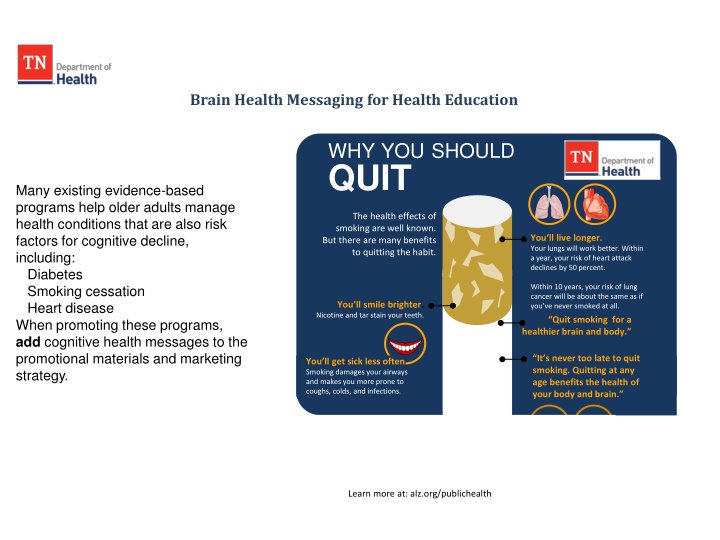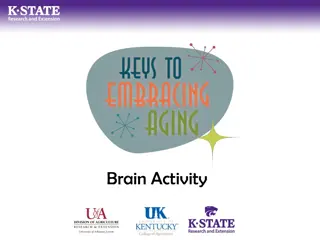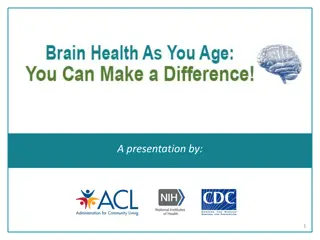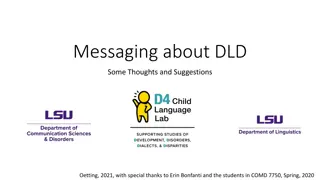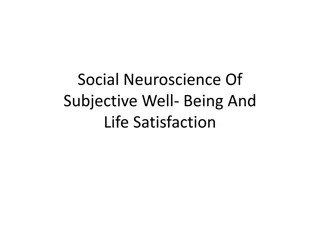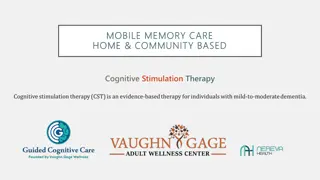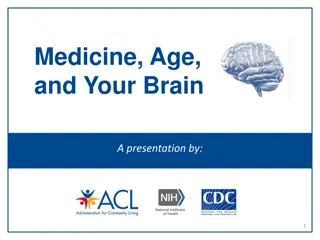Brain Health Messaging for Health Education: Promoting Cognitive Well-being
Evidence-based programs for older adults focus on managing health conditions that are risk factors for cognitive decline, such as diabetes, smoking, and heart disease. By incorporating cognitive health messages into promotions, individuals are encouraged to address these risk factors early to support brain health and overall well-being. Quitting smoking, managing hypertension, maintaining a healthy weight, preventing head injuries, and engaging in regular exercise are highlighted as key strategies for promoting cognitive health and reducing the risk of dementia.
Download Presentation

Please find below an Image/Link to download the presentation.
The content on the website is provided AS IS for your information and personal use only. It may not be sold, licensed, or shared on other websites without obtaining consent from the author.If you encounter any issues during the download, it is possible that the publisher has removed the file from their server.
You are allowed to download the files provided on this website for personal or commercial use, subject to the condition that they are used lawfully. All files are the property of their respective owners.
The content on the website is provided AS IS for your information and personal use only. It may not be sold, licensed, or shared on other websites without obtaining consent from the author.
E N D
Presentation Transcript
Brain Health Messaging for Health Education WHYYOUSHOULD QUIT Many existing evidence-based programs help older adults manage health conditions that are also risk factors for cognitive decline, including: Diabetes Smoking cessation Heart disease When promoting these programs, add cognitive health messages to the promotional materials and marketing strategy. The health effects of smoking are well known. But there are many benefits to quitting the habit. You ll live longer. Your lungs will work better. Within a year, your risk of heart attack declines by 50 percent. Q Within 10 years, your risk of lung cancer will be about the same as if you ve never smoked at all. Quit smoking for a healthier brain and body. You ll smile brighter. Nicotine and tar stain your teeth. It s never too late to quit smoking. Quitting at any age benefits the health of your body and brain. You ll get sick less often. Smoking damages your airways and makes you more prone to coughs, colds, and infections. Learn more at: alz.org/publichealth
Brain Health Messaging for Health Education Smoking Smoking may increase your risk for dementia. Stop now to reduce your risk. Quit smoking for a healthier brain and body. If you smoke, quitting now may reduce your risk for dementia. It s never too late to quit smoking. Quitting at any age seems to benefit the health of your brain and body. Mid-Life Hypertension Heart disease and high blood pressure can damage your brain s health. Get your blood pressure checked regularly. Work with your health care professional to control your blood pressure and protect your brain health. Keep your blood pressure under control for a healthier body and brain. High blood pressure increases your risk for heart disease and possibly dementia. Dementia and stroke are more likely to affect people with high blood pressure. Don t take unnecessary risks. Keep your blood pressure under control. Learn more at: alz.org/publichealth
Brain Health Messaging for Health Education Obesity Maintain a healthy weight. It s not only good for your heart, it s good for your brain. Obesity in middle age may increase your risk of dementia. Evidence shows that risk factors for heart disease including obesity can also have a negative impact on your brain s health. Take care of both your heart and brain. Eat a healthy diet, control your weight, and exercise regularly. Eat a healthy diet with less fat and more vegetables and fruit to help control your weight and help your brain stay healthy. Head Injury Major injuries to your head can raise your risk of dementia. Younger: Wear a seat belt and use a helmet when playing contact sports or riding a bike. Protect your brain today. Older: Wear a seat belt, use a helmet when riding a bike, and make your home safer in places where you could trip, slip, or fall. Head injuries increase your risk of dementia. Learn more at: alz.org/publichealth
Brain Health Messaging for Health Education Exercise Exercise is not only good for your body; it s also good for your brain. Get regular exercise that makes your heart beat faster, which increases blood flow to the brain and body. Take care of both your heart and brain. Eat a healthy diet, control your weight, andexercise regularly. Physical activity is an important part of keeping your brain and your body healthy. Choose exercise you enjoy so you ll be more likely to do it again and again. Pick an exercise that makes you think or talk with other people, such as a dance class or walking with a friend. By using your brain and your body, you can get the most out of the time you spend exercising. Physical activity can help build your brain health by lowering risk factors such as high blood pressure, diabetes and high cholesterol. It s never too late to start exercising for better health for your brain andbody. Learn more at: alz.org/publichealth
Brain Health Messaging for Health Education WHYYOUSHOULD QUIT The health effects of smoking are well known. But there are many benefits to quitting the habit. You ll live longer. Your lungs will work better. Within a year, your risk of heart attack declines by 50 percent. Q Within 10 years, your risk of lung cancer will be about the same as if you ve never smoked at all. You ll smile brighter. Nicotine and tar stain your teeth. Quit smoking for a healthier brain and body. It s never too late to quit smoking. Quitting at any age benefits the health of your body and brain. You ll get sick less often. Smoking damages your airways and makes you more prone to coughs, colds, and infections. Learn more at: alz.org/publichealth
